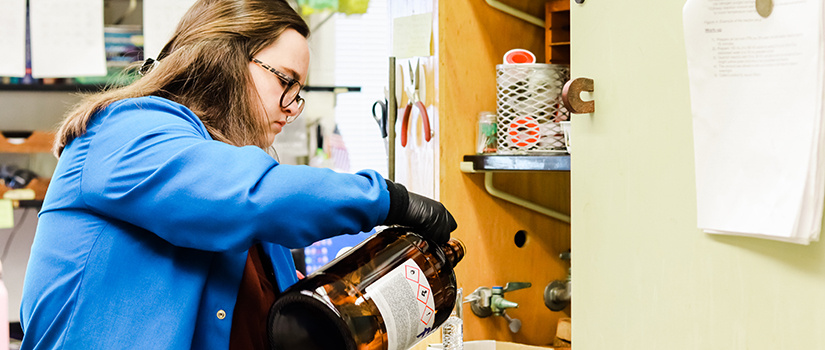Growing up in the Deep South, Grace Thaggard never saw chemistry as a viable career path. “I didn’t see people who were scientists,” she explains. Studying the sciences was simply a means to get into medical school, not a profession in its own right… or so she thought.
Now, the 23-year-old Mississippi native is proving her younger self wrong. Thaggard, who just completed her first year of a doctoral program at the University of South Carolina, is making a name for herself in chemistry as a researcher and science educator. This spring, she received the Department of Chemistry and Biochemistry’s Excellence in Teaching award. Weeks later, she learned that she had been named a recipient of the NSF Graduate Research Fellowship.
What changed her mind about pursuing chemistry? A national fellowship experience in Germany, of all things.
Her sophomore year of college, Thaggard was approached by her German professor to apply for the DAAD RISE, a summer research internship that places STEM undergraduates with doctoral students at top German universities.
While chemistry research was a major component of the experience, the main draw for Thaggard was getting paid to live in Germany for three months. Though she was working in a lab at the time, she found herself gravitating more towards language study than research.
“Then, I got accepted to the RISE program,” she says. “And that’s not something you turn down.”
It was only later that she realized just how pivotal of a moment this decision would be for her chemistry career.
For one, getting hands-on experience at Karlsruhe Institute of Technology, as Thaggard did, can open a world of opportunities in the field. More importantly though, experiencing different labs showed her that she loved chemistry and could thrive doing research that was important to her.
The DAAD RISE showed her that she could have an impact on the world as a scientist, more specifically that she could use chemistry to create a better future through sustainability research. The experience motivated her to pursue a Ph.D. and inspired her to help other students realize that they, too, could have a future in science.
At South Carolina, she works with professor Natalia Shustova to research materials that change property when exposed to light. While this project has large implications for the future of sustainable technology, Shustova and her team of researchers also use their findings to engage in community outreach and science education.
Painting a t-shirt that changes color in the sun is a good way to show K-12 students that science can be fun. For college students, the presentation has an even larger purpose. “A lot of students, especially first generation college students, don't know that grad school is a financially accessible option,” Thaggard explains. “We try to show them that this is a career that you can do and that’s available to everyone regardless of your background.”
Thaggard’s desire to create a better future through research and education is evident to those who work with her.
Undergraduate Kelly Forrester, for whom Thaggard serves as a research mentor, says, “Grace is a big reason that I look forward to coming to the lab everyday. She has constantly helped me understand now only what I’m doing, but why I’m doing it.”
To Shustova, Thaggard stands out as a “one of-a-kind” student. “To have her on my research team is the biggest gift I have got during my professional career,” she says.
Yet Thaggard is still surprised by just how strongly her research and vision resonate with others. When she found out this spring that she had received the NSF Graduate Research Fellowship, she was shocked.
“I did the application as a learning process,” she says, explaining that Shustova talked her into applying. “I said, ‘Okay, I'm going to learn about my science and I'm going to learn how to write a proposal and how to present myself.’ That was my goal. And so when I got it, I was floored. It’s validating to feel like my science is interesting, but knowing that people want to support me is just very humbling.”
So what’s next for Thaggard as she heads into her second year of graduate school?
She will continue to support students as a research mentor for undergraduates, but the NSF funding has given her the financial freedom to dive deeper into her own research projects.
“What’s exciting is that I’m not exactly sure what the next steps in my research are going to be. For the next four years, my job is just to explore my interests in the lab,” she says. “The door is wide open right now.”
Students interested in learning more about DAAD RISE, NSF GRFP or other external funding opportunities should contact National Fellowships & Scholar Programs.
